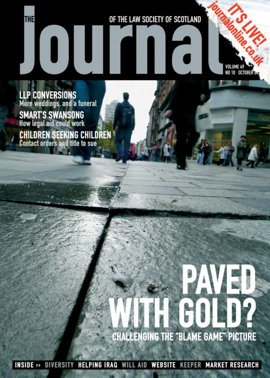In harmony

In the Journal for July 2003, the Property Standardisation Group announced the launch of the Group, now familiarly known to many as the PSG.
The PSG was born out of discussions among a few law firms who regularly practise in the area of commercial property, and who were seeking to determine what steps could be taken to standardise documents and processes in order to speed the process of handling property transactions, utilising the benefits of technology along the way.
Last year’s article also announced the launch of a number of documents including a due diligence questionnaire and forms of letter of obligation. It is gratifying to the PSG that these documents do appear to be in reasonably regular use already. The purpose of this note is to update the readership of the Journal on what the PSG has been up to in the last few months.
At the turn of the year the PSG produced guidance and suggested clauses to deal with some of the issues arising from the introduction of SDLT. Douglas Hunter of Dundas & Wilson alerted the profession to these in a letter to the Journal in February and, again, it would appear that the efforts of the PSG in this regard have been of benefit to the profession. We hope that the exercise proved how useful the PSG can be in offering guidance with a view to streamlining processes and overcoming areas of common difficulty.
Next, the PSG turned its attention to a suite of documents which it has generally referred to as “management documents”. The PSG had in mind here the routine documentation of property management, which is (or should be) relatively straightforward, but in relation to which there was a need to speed up the process in order to streamline matters for the benefit of clients, and lawyers, and also a need to harmonise the various disparate styles, all of which sought to achieve the same objective but by slightly different means. That is of course at the core of the PSG’s objectives. The PSG has now produced a suite of such documents and they are available to view and download from the PSG website (www.psglegal.co.uk). They comprise:
- rent review memorandum
- renunciation
- assignation
- letter of consent to assignation
- letter of consent to sublease
A form of guarantee and two forms of licence for works (one bipartite and one tripartite – i.e. head landlord, tenant and subtenant) will follow very shortly.
All these documents have been drafted by drawing on the experience of the PSG members with a view to covering all the standard issues and, where relevant, offering a sensible balance of interest between the parties. That having been said, the PSG found that there were relatively few instances where there was a need to consider any such balance: where it did arise was largely in relation to such matters as whether or not landlords’ legal costs should be “reasonable”. In the view of the PSG, it would be disappointing if we as a profession still debated that sort of issue.
The suite of management documents comes in each case with a set of guidance notes which indicate how they are to be used. It is hoped that the notes are helpful, without crossing the boundary between, on the one hand, being useful and, on the other hand, teaching one’s granny to suck eggs.
The PSG is looking also now at further projects. In particular, work is underway on producing a Scottish version of the City of London Law Society certificate of title, which is probably now the industry standard in English transactions and has infiltrated across the border, but on the basis that each of us has produced our own “kilted” version. The PSG is therefore seeking to agree on a single tartan. Other current projects include the production of a foreign opinion letter confirming validity, compliance with registration requirements, etc in relation to documents executed by foreign companies. The PSG will also be looking at forms of documentation emanating from feudal reform.
Finally, may I just say, first, that the PSG will be delighted to hear views from other practitioners regarding documentation that the PSG has already produced and/or documentation that they may wish the PSG to consider and, secondly, thanks are due as ever to the consultee firms who, although not directly involved in the drafting of documents, have been kind enough to give us their observations on the drafts as they have evolved. Contact details for the current members of the PSG are as follows:
douglas.hunter@dundas-wilson.com
Iain Macniven, Maclay Murray & Spens, Glasgow
In this issue
- Citizenship, society and solicitors
- The well unfair state
- Litigation nation
- Best medicine
- Take a deep breath
- What title?
- Walk this way?
- Know your strategy
- e-quilibrium?
- The researchers
- Rights out of anarchy
- Political correctness or positive change?
- Steering clear
- How far can a board go?
- Major role for new tribunal
- The race is on (again)
- Planning a superhighway
- Website reviews
- Book reviews
- Single survey's lonely heart
- In harmony
- Clearing the path






